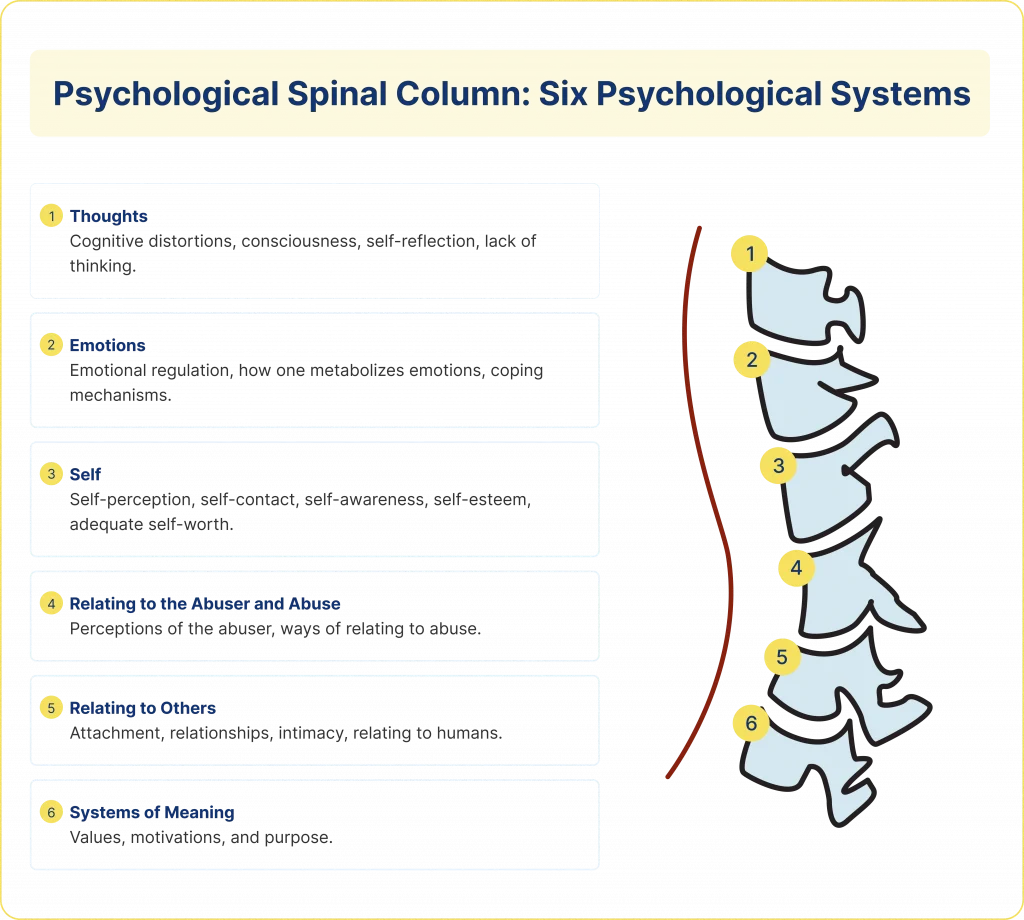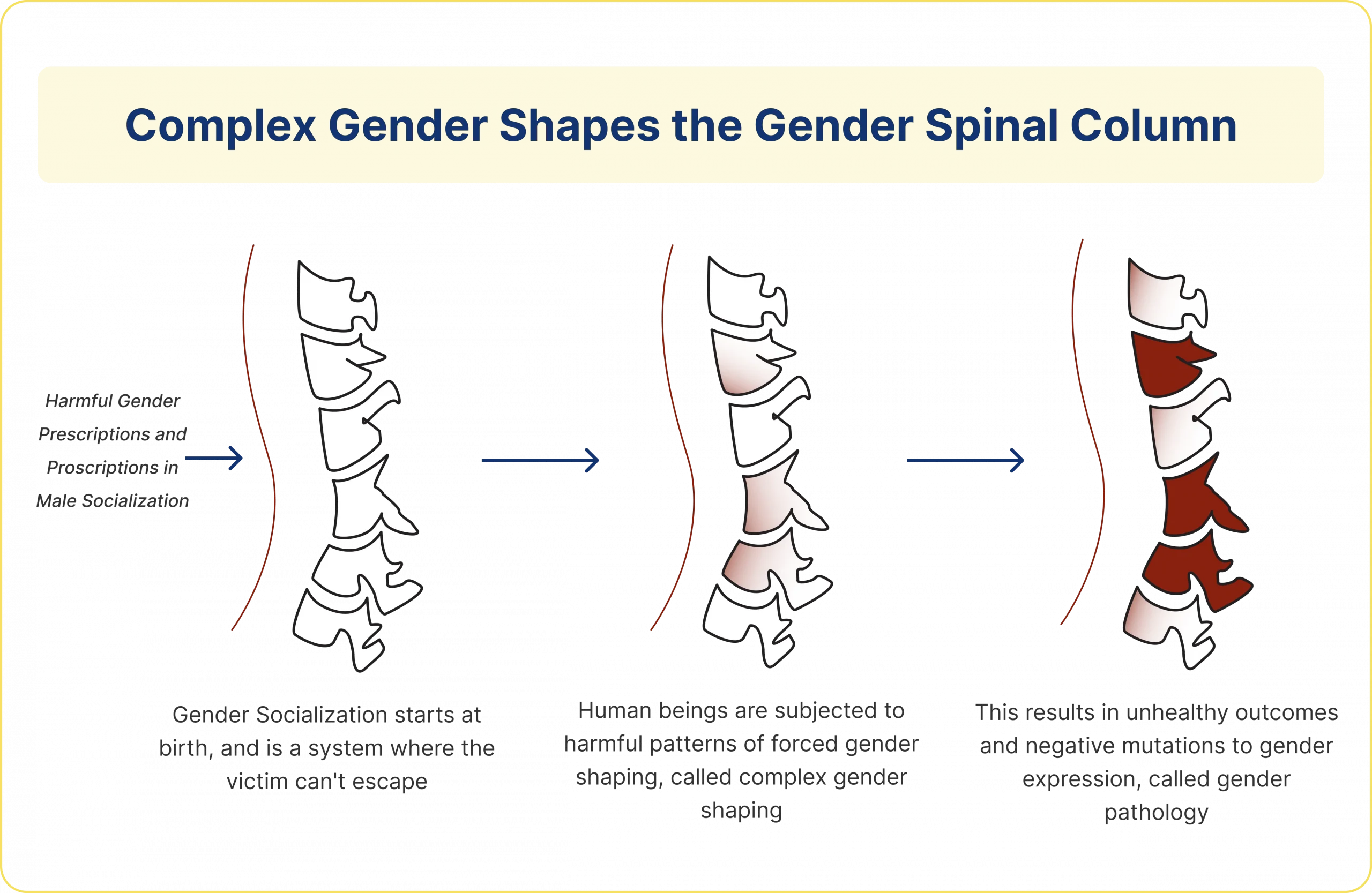Understanding Complex Trauma and Complex Trauma Shaping: Educational Metaphors for the Shaping Process
This section explores the concept of complex trauma and introduces the notion of complex trauma shaping. Building on Judith Herman’s foundational work (Herman, 1997), the discussion extends to illustrate how repeated trauma shapes the psyche over time. Educational metaphors are used to clarify the process and impact of complex trauma shaping, enhancing understanding of its influence on psychological development and personality.
Complex trauma, as defined by Judith Herman (1997), refers to the profound and enduring impact of chronic, repetitive traumatic events, particularly in situations where the individual is in a state of captivity and unable to escape. Unlike post-traumatic stress disorder (PTSD), which typically arises from a single traumatic event, complex trauma results from prolonged exposure to subjugation and harm.
What is Complex Trauma?
Judith Herman’s seminal description of complex trauma distinguishes it from PTSD. Complex trauma arises from repeated harm in a state of captivity, where victims are subjected to totalitarian control over extended periods. Examples include hostages, prisoners of war, concentration camp survivors, and victims of domestic abuse, childhood physical or sexual abuse, and organized sexual exploitation (Herman, 1997, pp. 121-122).
Herman identifies six core symptoms of complex trauma resulting from such conditions:
- Alterations in Affect Regulation: includes self-injury, suicidal preoccupation, and extreme anger.
- Alterations in Consciousness: such as amnesia, dissociative episodes, and obsessive rumination.
- Alterations in Self-Perception: includes helplessness, shame, guilt, and self-blame.
- Alterations in Perception of the Perpetrator: such as preoccupation with the relationship with the perpetrator, attributions of power, and acceptance of the perpetrator’s belief system.
- Alterations in Relations with Others: includes isolation, distrust, and disrupted intimate relationships.
- Alterations in Systems of Meaning: such as, loss of faith, hopelessness, and despair.
What is Complex Trauma Shaping?
Complex trauma shaping extends Herman’s framework to apply to broader human experiences, including child and adolescent development. This grounded theory, developed through comparing clinical histories and psychological testing profiles, describes how repeated patterns of harm shape the psyche in six specific ways, applying the essential process of shaping to normative human experiences. This shaping involves patterns of harm, which can be subtle and not so extreme, along with habitual coping responses, progressively influence personality development and can lead to maladaptive personality traits or disorders and life symptoms and problems.
Complex trauma shaping (CTS) is defined as the subjugation to repeated patterns of harm, with a consistent theme, over a prolonged period, where the victim lacks a viable escape route and is disempowered. These experiences, combined with habitual coping strategies, progressively shape a person’s six psychological systems:
- Thoughts: Cognitive distortions, consciousness, self-reflection, lack of thinking.
- Emotions: Emotional regulation, how one metabolizes emotions, coping mechanisms.
- Self: Self-perception, self-contact, self-awareness, self-esteem, adequate self-worth.
- Relating to the Abuser and Abuse: Perceptions of the abuser, ways of relating to abuse.
- Relating to Others: Attachment, relationships, intimacy, relating to humans.
- Systems of Meaning: Values, motivations, and purpose.
Educational Metaphor for the Shaping Process: “Drops of Water on a Rock”
An effective metaphor for complex trauma shaping is the gradual erosion of a rock by water. Just as continuous drops of water eventually shape a rock, repeated patterns of harm shape the psyche. This metaphor emphasizes the cumulative impact of trauma over time, highlighting the progressive nature of psychological shaping, or complex trauma shaping.
Complex Trauma Shaping Influences Personality
The eventual “shape” of the rock in this metaphor represents the individual’s personality structure. According to Millon (2009), personality is defined as a person’s habitual methods of thinking, feeling, behaving, and relating. Complex trauma shaping influences these habitual patterns, often leading to maladaptive personality traits or disorders characterized by distorted thinking, problematic emotional responses, disruptive behaviors, and interpersonal difficulties.
Educational Metaphor for the Six Psychological Systems: The Psychological Spinal Column
The six specific psychological systems affected by complex trauma shaping can be conceptualized as a psychological spinal column with six vertebrae. This metaphor helps illustrate how these experiences progressively shape a person’s psyche over time.

Male Socialization as Complex Trauma: Introducing Complex Gender Shaping and Gender Pathology
In this section, we will now apply the concept of complex trauma shaping to gender socialization, specifically male socialization. However, it is critical to note that all humans are subjected to complex gender shaping and we are all gender mutants. Gender socialization constitutes a form of psychological and social violence that subjects individuals to an unhealthy system of harm over an extended period. Victims cannot escape this pervasive influence. This section explores gender development through the lens of complex trauma, introducing the concept of “complex gender shaping” and recognizing the resultant symptoms and unhealthy expressions as “gender pathology.”
Social-Cultural Context Related to Masculinity
Gender is not solely the product of biology or sexuality but is largely socially constructed. Gender is taught and learned, and gender identity differs from biological or natal sex. Masculinities are shaped by social, cultural, and contextual norms (APA, 2018). Despite transhistorical and transcultural variations, male socialization has also been profoundly influenced by a patriarchal archetype that pervade human collective expressions of masculinity.
In the contemporary North American and Western context, masculinity has suffered the erosion of vital processes such as healthy initiation, brotherhood, intimacy among men, and the father-son bond. This erosion has led to a progressive lack of transmission of generational wisdom, essential for healthy psychological development. Each generation of psychologically immature boys fathers the next, increasing the disparity between men’s chronological and psychological ages.
Male Socialization and Toxic Masculinity
The unhealthy outcomes among boys and men, including violence, are largely the result of male socialization rather than biology. Terms such as “toxic masculinity,” “hegemonic masculinity,” and “hostile masculinity” describe these outcomes. Male socialization involves teaching and reinforcing specific masculine ideologies—sets of prescriptive and proscriptive thoughts about being male (Levant & Richmond, 2007; Pleck, Sonenstein, & Ku, 1994). These ideologies prescribe rules such as “be independent” and proscribe behaviors like “boys cannot cry or express emotions.”
Masculinity Ideology: Masculinity ideology is a set of descriptive, prescriptive, and proscriptive cognitions about boys and men (Levant & Richmond, 2007; Pleck, Sonenstein, & Ku, 1994).
Prescriptive focuses on what is recommended or established as a rule.
Proscriptive focuses on what is not allowed.
So, these prescripts, act like a prescription written on what it means to be a boy, a man and how ideal masculinity is defined. Related are also all the gender prohibitions, the ways of being that are not allowed and will be enforced through control, domination, violence and institutional backing. This is how gender is shaped. And these prescripts and proscripts related to male ideologies and masculine socialization are entirely mutated, unhealthy, outdated, dangerous and pathological from a clinical and psychological perspective – forms of mental illness – also known colloquially as, “toxic masculinity”.
Harmful Gender Prescriptions and Proscriptions in Male Socialization
Male socialization often involves harmful patterns of prescriptive and proscriptive messages that are inescapable and shape unhealthy gender ideologies. Examples of these messages include:
- Male Privilege: Believe that being male grants certain privileges and rights over women.
- Sexual Entitlement: Feel entitled to sexual gratification, even if it harms others.
- Winning and Competition: Winning is a marker of masculinity; competition and conquest are central.
- Emotional Suppression: Emotions, love, and intimacy are unmasculine and should be suppressed.
- Objectification of Women: View women as objects, less than, and an underclass.
- Sexual Pursuit: Always seek sexual gratification and never refuse a sexual opportunity.
- Functional Identity: Be an “object” (workhorse, fighting machine) or a “function” (protector, provider).
- Violence and Domination: Esteem is gained through violence and domination; aggression and dominance are valued.
- Emotional Restraint: Do not cry, show weakness, or express vulnerability.
- Violence Over Voice: Choose violence over using the human voice, communication, empathy and understanding.
- Independence: Be tough, athletic, strong, courageous, and independent; do not depend on anyone.
- Denial of Care and Nurturing: Caring and nurturing are not masculine traits.
- Devaluation of Kindness: Kindness, being loving, and compassion are degraded and feminized.
- Power and Control: The acquisition of power defines masculine identity; demonstrate power and control, especially over women and the vulnerable.
- Ruthlessness: The more ruthless and violent, the more masculine status is gained.
- Heterosexist Norms: Be heterosexual; do not act “gay” or “feminine.”
- Conformity to Gender Rules: Do not question or challenge gender rules; transgressing gender norms results in punishment and persecution.
- Anti-Intimacy: View intimacy, vulnerability, equal relating, and authenticity as feminine and therefore undesirable.
- Ownership in Marriage: Marriage defines a woman as property to own.
These prescriptive and proscriptive messages are ingrained through systemic socialization, reinforcing and enforcing a toxic masculinity that harms both individuals and society.
Male Socialization as a System of Violence
The socialization of boys is a form of systemic abuse and human torture. Judith Herman defines complex trauma as “a history of subjugation to totalitarian control over a prolonged period (months to years).” Gender socialization meets these criteria, subjecting individuals to patterns of harm over time in a context of captivity or disempowerment.
Complex Gender Shaping and Gender Pathology
Complex gender shaping involves repeated harm with consistent themes over a prolonged period, resulting in maladaptive outcomes. This process causes gender pathology— gender mutations, which are the unhealthy gender-based outcomes, expressions, and disorders. The harmful shaping of boys into unhealthy configurations constitutes systemic abuse and complex trauma.
Gender Pathology as a Personality Template
Gender pathology can exist structurally within the personality, forming a “gender template” influenced by societal and cultural trauma shaping as well as the individual’s personal gender story. This template shapes thoughts, feelings, behaviors, and relational patterns. The concept of the “masculinity spinal column” metaphorically represents six psychological functions necessary for psychological stability, each potentially mutated by gender shaping.

The Masculinity Spinal Column: Six Symptoms of Male Socialization
Male socialization can be conceptualized as shaping a gender spinal column, where each vertebra represents a different aspect of the psyche, progressively shaped and mutated over a lifetime by forced gender norms. This metaphor illustrates how male socialization acts as a form of violence, resulting in harmful outcomes and habitual patterns in personality.
- Thought System: The thought system is mutated by forced adherence to unhealthy gender prescriptions and proscriptions, shaping a specific unhealthy male ideology. Boys and men are conditioned to develop a mindset of entitlement, particularly around power and sexuality. This unhealthy belief system fosters a sense of being owed and deserving based on gender, leading to a disregard for the rights and well-being of others. Masculine socialization encourages a denial of male power and privilege, reinforcing existing power structures. Consequently, the male thought system becomes distorted, promoting violence, objectification, and dehumanization of others and the self.
- Emotional System: Male socialization teaches boys to suppress and mismanage emotions, leading to mental health issues in adulthood. Despite the established importance of healthy emotional regulation, boys are taught to avoid feeling emotions and to deny emotional experiences as part of being a man. This suppression results in numerous relational and social problems, as men struggle with authentic emotional expression and connection. The emotional system is thus mutated towards not feeling, rather than experiencing emotions healthily.
- Self-Perception and Identity: The masculine ego is devalued, leading to systemic neglect and objectification of the self. Healthy self-perception and self-connection are vital for psychological stability, but male socialization often results in self-alienation. Men learn to see themselves as mere functions or objects (e.g., “workhorse” or “protector”), leading to a lack of self-worth and awareness. This objectification of the self makes it more likely to objectify others, perpetuating a cycle of dehumanization and suffering.
- Relation to Abuse: Male socialization grooms boys to prioritize violence over voice, viewing violence as a key marker of masculinity and a way to gain gender esteem and status. Instead of teaching boys how to communicate effectively and resolve conflicts, they are taught to use force. This predisposition towards violence can lead to a complex relationship with abuse, where men may replicate abusive behaviors unconsciously, contributing to a culture of toxic masculinity.
- Relation to Human Beings: Masculine socialization discourages intimacy and genuine human connection or equality, promoting dominance and independence instead. Boys are taught to avoid vulnerability and emotional closeness, leading to a lack of essential relational skills. This results in men who struggle with forming healthy relationships and often feel isolated. The inability to relate authentically to others is crippling, as human connection is fundamental for psychological well-being.
- Meaning of Life: Male socialization deeply influences a man’s sense of life’s meaning. With an unhealthy thought system, emotional suppression, objectified self-perception, predisposition towards violence, and impaired relational skills, men often experience a diminished sense of purpose. This lack of meaning can lead to existential pain and suffering, driving men to unhealthy coping mechanisms. This symptom highlights the profound impact of male socialization on overall psychological health and the quest for a fulfilling life.
The gender spinal column metaphor illustrates how male socialization acts as a form of psycho-social violence that shapes and distorts various aspects of the psyche, leading to significant psychological harm and unhealthy patterns in personality and clinical expression.
Conclusion
Gender socialization, particularly male socialization, is a form of systemic and ongoing harm that meets the criteria for complex trauma. This process results in complex gender shaping and the manifestation of gender pathology. Understanding this dynamic is crucial for addressing the unhealthy outcomes associated with toxic masculinity and fostering healthier gender development and expressions. It connects the clinical science of complex trauma to gender socialization and describes how we are all gender mutants.







